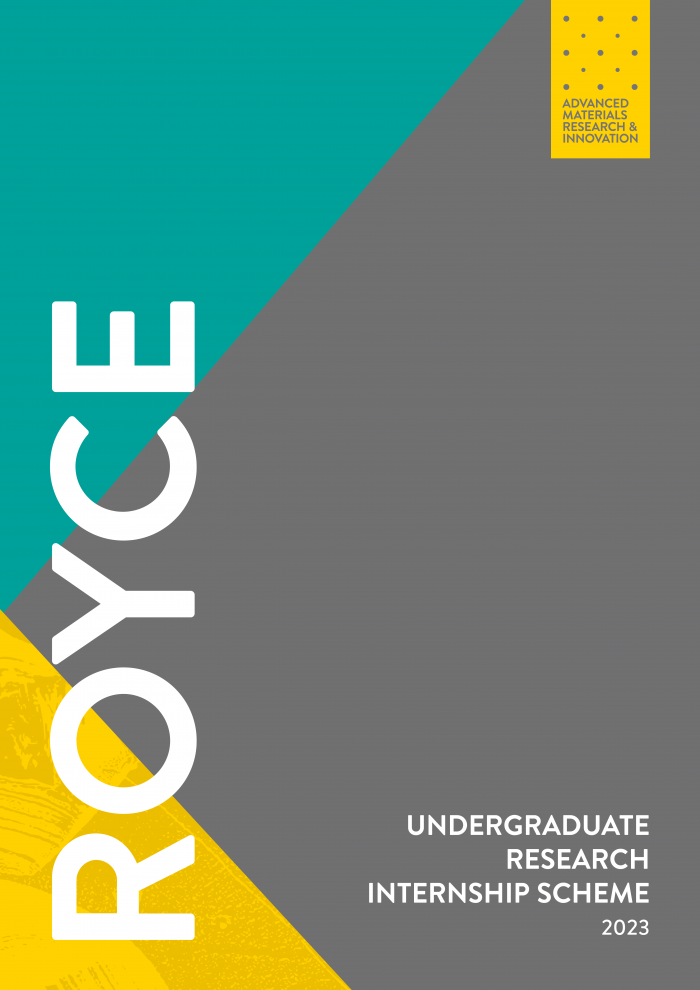This website uses cookies so that we can provide you with the best user experience possible. Cookie information is stored in your browser and performs functions such as recognising you when you return to our website and helping our team to understand which sections of the website you find most interesting and useful.

Royce Undergraduate Research Internship Scheme | 2023
Applications close 31 January 2023
Overview
Each year Royce runs an internship scheme to give researchers the opportunity to host an undergraduate student on a summer research project in materials science. Researchers are invited to apply for funding which will contribute towards the cost of running an internship within their department or research group. The funding from Royce is intended to support an 8-week project, running between June and September 2023.
Project applications will be reviewed by the Royce Training team and funding will be awarded based on the following criteria:
• Strength of project proposal
• Relevance to Royce research area themes
• Benefit to student intern
• Benefit to mentor and/or lab hosting the intern
Before applying, please read through the information below, noting in particular what the funding does and does not cover.
Applications to the 2023 scheme have now closed.
Sign up to our mailing list to stay in the loop on future funding opportunities
Who can apply?
The scheme is open to applications from academic researchers in materials science across all UK HEIs.
We welcome applications from post-doctoral researchers, research fellows, staff scientists, lecturers, and principal investigators. University departments can also submit applications for funding as part of their own internship programmes.
We are eager to support post-doctoral and early-career researchers, for whom this may be their first opportunity to mentor a student. Senior academics and principal investigators are welcome to apply, but priority will be given to junior researchers.
Who can become and intern?
The scheme is intended for undergraduate students on a course related to materials science or engineering. Students should be moving from their penultimate to final year of study, however exceptions may be considered (gap years, year in industry/abroad) or where integrated Master’s courses are offered as the norm. Final year students already accepted onto a PhD programme are not eligible.
Who benefits?
Student interns will experience in materials science research and learn how an academic research group operates. They will have the opportunity to manage their own work, participate in group meetings, conduct experiments, and develop collaborative working skills. There is also the possibility of their work contributing towards research publications from the group.
The internship is a great taster for what a PhD might involve, before a student begins the application process. This is a positive experience that can guide a student towards a successful PhD application; it also allows a chance for them to reflect and consider if pursuing a post-graduate course is right for them.
Project mentors have the chance to influence and encourage the career development of an undergraduate student, guiding them through the project, and involving them in the work of their research group. For post-doctoral and early-career researchers the projects can be a valuable opportunity to develop mentorship skills and gain experience in scientific leadership. Established group leaders also benefit from an opportunity to engage with the student and share their scientific career experiences with them.
Academic hosts have a chance to work with new students and share career guidance. Running successful internship projects can strengthen the visibility and reputation of a department, making it more attractive to future students.
How are research projects run?
Researchers awarded funding will need to advertise and recruit student interns within their own institute. This happens either by directly offering places to specific students or through departmental or school internship schemes. Wherever possible, consideration should be given to ensure diversity, inclusion and openness in the recruitment process.
During the summer the researcher will work with the student to explain the extent of research project, establish them in the laboratory, and help them work alongside other group members. Following the conclusion of the projects Royce will invite all students and their mentors to join us at a virtual student conference, where they will have an opportunity to share the work they conducted during their project.
How does the funding work?
The funding awarded by Royce must be used towards the cost of employing an undergraduate student through an existing scheme within their host institution. An intern should work no more than 35 hours a week over the 8 weeks of their project. Funding is capped at £3200 and £3500 in London; each week being equivalent to £400.00 (£437.50 in London), should a shorter project be run.
The applicant, research group or department will need to ensure the full costs associated with the intern are met. The above funding is the maximum that will be provided by Royce for each intern.
Other funding considerations:
- Funding must not be used for material costs, equipment access, or other consumables.
- Funding is awarded for an 8-week project; funds to cover a longer project will not be covered by Royce.
- Interns should be paid as their project progresses, as an employee of the host organisation. Renumeration should not wait until receipt of the Royce funding.
- Funding will be paid retrospectively upon the completion of the project.
- Royce will liaise with hosts and provided financial contacts to resolve claims in October once the project is completed.
- The bursary does not include National Insurance Contributions or holiday pay; it is up to each host institute to make their own arrangements to cover these if required.
Things to note
- Applicants must provide both a principal investigator and a mentor wherever possible.
- Access to equipment or training on specialist facilities can often delay an intern from progressing in a project.
KEY EVENTS
Mid-December – Applications open
31 January 2023– Applications close
Late January – Applications reviewed
Early February – Response to all applications sent
March-May – Students selected for projects
Mid-June – Kick-off virtual workshop with Royce
Late June-Early September – Research projects run. As part of the summer programme, Royce will host several workshops for students to ask questions beyond their research
Mid-September – Internship conference
Late September – Student feedback survey
October-November – Reconcile budget with Royce
Applications for the 2023 scheme closed at 23:59 on 31 January 2023.
Sign up to our mailing list to stay in the loop on future funding opportunities
For information about the Royce Undergraduate Internship Scheme 2023 please contact Royce Student Engagement Manager Dr George Miller at george.miller@royce.ac.uk


